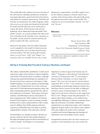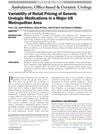 14 citations,
January 2014 in “Journal of Cutaneous and Aesthetic Surgery”
14 citations,
January 2014 in “Journal of Cutaneous and Aesthetic Surgery” Scalp Roller therapy helped improve hair growth in patients with hard-to-treat alopecia areata.
 13 citations,
December 2020 in “Dermatologic Therapy”
13 citations,
December 2020 in “Dermatologic Therapy” Sebaceous glands in our skin, developing during pregnancy and active in puberty, produce sebum for skin lubrication, temperature control, and fighting germs, also help in hormone regulation, and their dysfunction can cause conditions like acne and hair loss.
 12 citations,
January 2016 in “Skin appendage disorders”
12 citations,
January 2016 in “Skin appendage disorders” Repeated botulinum toxin injections for forehead wrinkles may cause hairline recession in some women.
 12 citations,
October 1995 in “The Journal of Clinical Endocrinology & Metabolism”
12 citations,
October 1995 in “The Journal of Clinical Endocrinology & Metabolism” Skin changes can indicate hormonal imbalances and help diagnose endocrine disorders.
 11 citations,
August 1997 in “Expert Opinion on Therapeutic Patents”
11 citations,
August 1997 in “Expert Opinion on Therapeutic Patents” Many potential alopecia treatments need more testing to confirm they promote acceptable hair growth with minimal side effects.
 11 citations,
May 1990 in “Journal of Dermatological Science”
11 citations,
May 1990 in “Journal of Dermatological Science” Diazoxide applied to the skin can increase hair growth without harmful side effects.
 11 citations,
May 2009 in “Medical Hypotheses”
11 citations,
May 2009 in “Medical Hypotheses” Male pattern baldness is an unintended side effect of the body's use of androgens for muscle growth, especially in those genetically prone to it.
 10 citations,
January 2014 in “Journal of Mid-life Health”
10 citations,
January 2014 in “Journal of Mid-life Health” Menopause can cause skin issues, and seeing a dermatologist helps.
 9 citations,
July 2014 in “Facial Plastic Surgery”
9 citations,
July 2014 in “Facial Plastic Surgery” Endoscopic-assisted facelifting is safe and effective with minimal complications and excellent long-term results.
 8 citations,
July 2012 in “Cambridge University Press eBooks”
8 citations,
July 2012 in “Cambridge University Press eBooks” Androgens can both increase body hair and cause scalp hair loss.
 8 citations,
September 2003 in “Journal of dermatological science”
8 citations,
September 2003 in “Journal of dermatological science” Substance P helps hair grow longer and faster.
 8 citations,
May 1996 in “Endocrinology”
8 citations,
May 1996 in “Endocrinology” Certain adrenal hormones can strongly stimulate oil gland growth in hamster skin, similar to male hormones.
 8 citations,
June 1979 in “JAMA”
8 citations,
June 1979 in “JAMA” Synthetic hair implants can cause severe infections and are risky.
 7 citations,
January 2017 in “Journal of cosmetology & trichology”
7 citations,
January 2017 in “Journal of cosmetology & trichology” Good nutrition is crucial for healthy hair and can help with hair loss without medication.
 6 citations,
July 2015 in “Journal of Investigative Dermatology”
6 citations,
July 2015 in “Journal of Investigative Dermatology” Chicken feather gene mutation helps understand human hair disorders.
 6 citations,
August 2014 in “Dermatologic Surgery”
6 citations,
August 2014 in “Dermatologic Surgery” PRP injections may improve hair loss condition, but more research needed.
 6 citations,
December 2013 in “Journal of Cutaneous Pathology”
6 citations,
December 2013 in “Journal of Cutaneous Pathology” Certain immune cells are more common on the top of the head and might help predict or treat common hair loss.
 6 citations,
October 2018 in “Dermatologic Surgery”
6 citations,
October 2018 in “Dermatologic Surgery” PRP therapy helps slow hair loss and increases hair thickness.
 6 citations,
February 2015 in “Dermatologic Surgery”
6 citations,
February 2015 in “Dermatologic Surgery” The document concludes that a new training model could improve dermatology residents' skills in nail procedures and lead to more nail cases being treated by dermatologists.
 5 citations,
September 2022 in “Research Square (Research Square)”
5 citations,
September 2022 in “Research Square (Research Square)” CD201+ fascia progenitors are essential for wound healing and could be targeted for treating skin conditions.
 5 citations,
January 2020 in “Skin Research and Technology”
5 citations,
January 2020 in “Skin Research and Technology” Minoxidil 5% works better than 2% for hair growth in male-patterned hair loss.
 5 citations,
August 2018 in “Urology”
5 citations,
August 2018 in “Urology” Independent pharmacies generally offer lower prices for certain generic urologic medications than chain pharmacies.
 5 citations,
August 2018 in “Ocular immunology and inflammation”
5 citations,
August 2018 in “Ocular immunology and inflammation” Methotrexate side effects vary by race and sex.
 5 citations,
January 2018 in “Springer eBooks”
5 citations,
January 2018 in “Springer eBooks” Acne in dark skin is influenced by environmental factors and can lead to hyperpigmentation, with various treatment options available.
 5 citations,
April 2013 in “Current Problems in Pediatric and Adolescent Health Care”
5 citations,
April 2013 in “Current Problems in Pediatric and Adolescent Health Care” The document concludes that early and personalized treatment for PCOS in adolescents is crucial to manage symptoms and prevent long-term health issues.
 5 citations,
August 2003 in “British Journal of Dermatology”
5 citations,
August 2003 in “British Journal of Dermatology” Iron deficiency might contribute to hair loss in women.
 4 citations,
March 2021 in “International Journal of Dermatology”
4 citations,
March 2021 in “International Journal of Dermatology” COVID-19 and related stress may increase hair loss known as Telogen effluvium.
 4 citations,
August 2017 in “The Nurse Practitioner”
4 citations,
August 2017 in “The Nurse Practitioner” Secondary amenorrhea has many causes and requires thorough evaluation to treat and restore menstrual cycles.
 4 citations,
January 2015 in “Journal of clinical & experimental dermatology research”
4 citations,
January 2015 in “Journal of clinical & experimental dermatology research” PRP injections may slightly improve hair density and count for male hair loss, but more research is needed.
 3 citations,
January 2023 in “Physiological Research”
3 citations,
January 2023 in “Physiological Research” Conditioned media from mesenchymal stem cells show promise for tissue repair and disease treatment, but more research is needed on their safety and effectiveness.






























